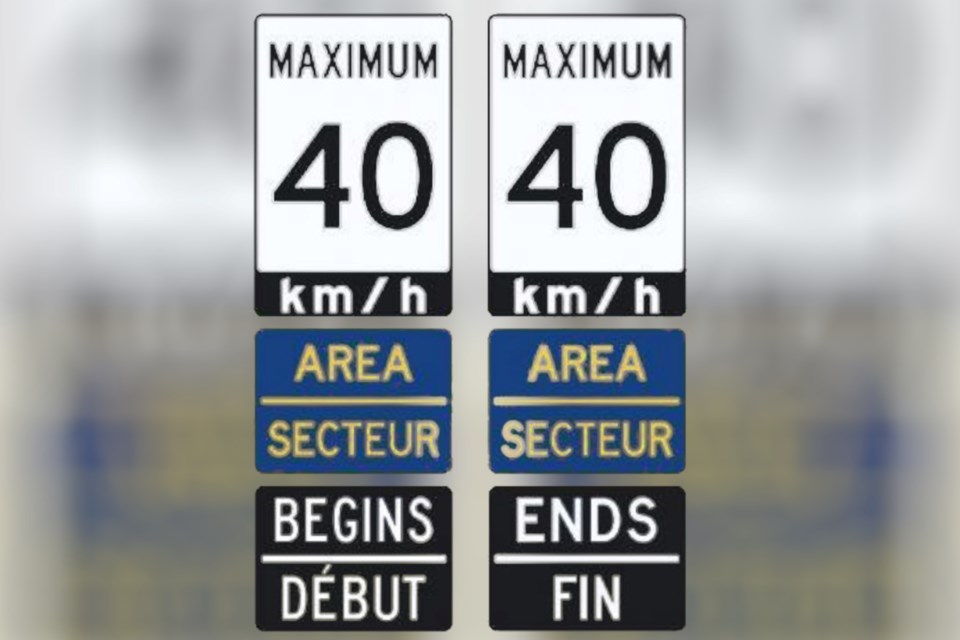Greater Sudbury is set to begin adopting gateway speed limit signs that limit vehicles to 40 km/h in a new pilot program slated to begin rolling out this year.
The long-talked-about pilot program will have 40-km/h signs installed at the entrances/exits to one neighbourhood this year, the city’s operations committee decided this week. A business case will come forward during 2023 budget deliberations that proposes the signing of additional neighbourhoods as part of a broader pilot program.
As of Monday’s meeting, city administrators remained undecided regarding which neighbourhood would be signed for this year’s preliminary pilot.
Gateway speed limit signs are posted at the entrances and exits to neighbourhoods. They indicate motorists are within a 40 km/h area with a notice that the affected area “begins/début” as motorists enter and “ends/fin” as they depart. The prescribed speed limit applies to all of the substreets within the area and does away with the need to sign every individual street.
The new speed limit will be less than the current speed limit of 50 km/h, and this week’s operations committee meeting found the city’s elected officials push for the program as a pilot rather than full-on permanent approval due to concerns related to its effectiveness.
“This program will only be effective with participation from Greater Sudbury police and their ability to enforce those speed limits,” city manager of growth and infrastructure Tony Cecutti told the committee.
There’s likely to be initial compliance with the new speed limits, but if people aren’t ticketed, they’ll learn by habit that they aren’t being enforced and the signs will effectively “mean nothing.”
“I’m not convinced that posting a sign is going to make anybody slow down,” Ward 9 Coun. and meeting chair Deb McIntosh said, adding that residents often urge city councillors to change the speed limits in order to slow traffic.
“Doing these pilots and determining whether they have an impact will help us both ways. Either it works and we’re able to expand upon it, or it doesn’t work and demonstrates that posting a sign without the other tools … doesn’t have an impact. They have to work together.”
The business case for next year’s budget deliberations proposes an investment of $72,000 for the installation of gateway speed limit signs in 12 neighbourhoods – one in each of the city’s wards. This pilot project would include 174 sign locations and 14 school zones. As part of the program, it’s recommended that school zone speed limits be reduced to 30 km/h so there’s a difference in speed limit to further slow down drivers in these areas. A business case will also come forward highlighting the latest cost associated with expanding the pilot throughout the entire municipality.
The gateway speed limit signs come out of a 2019 change in the Highway Traffic Act which began allowing municipalities to post lower speed limit signs at the entrances and exits to neighbourhoods and apply blanket speed limits within.
Prior to that, signs would have been required on every street in Greater Sudbury in order to reduce the residential speed limit to 40 km/h. This would require the installation of 9,600 signs at a 2014 estimated cost of $2.5 million.
Under the gateway speed limit sign model, only 850 signs would be required at a 2019 estimated cost of $320,000.
Although this week’s operations committee meeting decision still needs to be ratified by city council as a whole, committee decisions are rarely overturned.
Tyler Clarke covers city hall and political officials for Sudbury.com.
